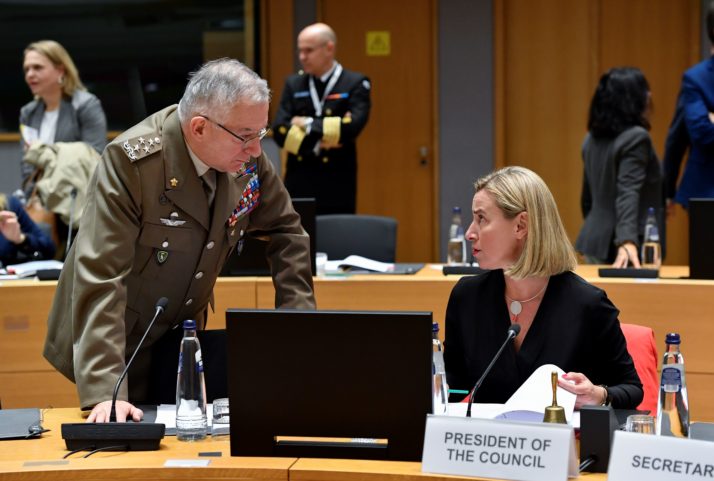The European Union’s top general has warned that not reviving a military mission to implement an arms embargo on Libya would mean the EU has failed a test of its new geopolitical ambitions.
In an interview with POLITICO, Italian General Claudio Graziano, the head of the EU’s military committee, also declared he had never seen “real war so close to the door of Europe” in his decades-long career. He cited the conflicts in Libya, Syria and North Africa’s Sahel region as examples of the tumult in the EU’s neighborhood.
On Monday, EU foreign ministers will discuss how to follow up on last month’s international conference on Libya in Berlin, where European powers sought to put on a display of unity after years of divisions over the conflict.
On their agenda is how to revive Operation Sophia, the naval mission in the Central Mediterranean tasked with overseeing the arms embargo and fighting human trafficking. The mission has been unable to deploy ships since March last year due to a decision pushed through by Italy’s then-Deputy Prime Minister Matteo Salvini.
EU foreign policy chief Josep Borrell and many EU governments favor restarting the mission. But Austria has led opposition to the proposal, with Chancellor Sebastian Kurz arguing the mission encouraged people-trafficking and illegal migration, as migrants knew they stood a chance of being rescued by EU ships and taken to Europe.
„In my long career, I’ve been many times in the field, in operations. I have not seen real war so close to the door of Europe.“ — Claudio Graziano, head of the EU’s military committee
EU officials say that the number of migrants leaving Libya has decreased since the operation was launched in 2015.
Graziano, who also serves as Borrell’s military adviser, suggested a decision to revive Sophia should be straightforward for the EU as the mission already exists, it already has a mandate to implement the arms embargo and that embargo has U.N. backing.
“You have just to go on with something that is approved,” he said.
If the plan to revive Sophia doesn’t succeed, it would send „an extremely negative message,“ Graziano said, as it would mean the EU is “not able to find a solution.”
Yet Graziano said he was “very optimistic” a solution would be found because the EU is now much more focused on security and defense than it was even a few years ago.
Graziano has been in his current post since November 2018, leading the work of the EU Military Committee, a body composed of the member states’ chiefs of defense.
‘War so close’
Before moving to Brussels, the four-star general held a variety of senior roles in the Italian military and in international operations, including as commander of the United Nations Interim Force in Lebanon. But, he suggested, Europe currently faces the most challenging security environment he has known as a military officer.
„In my long career, I’ve been many times in the field, in operations. I have not seen real war so close to the door of Europe,“ he said.
Graziano argued that even during the Balkan conflicts of the 1990s, when war raged inside Europe, the threat to the Continent was not as complex or as serious as it is today. He said the Continent faces a series of interlinked security challenges to its south — a “triangle of instability” composed of terrorism, illegal migration and failing states.
He traced much of the current instability in North Africa back to 2011, when Western powers helped depose the Gaddafi regime in Libya but proved unable to stop the country descending into a civil conflict, which has recently intensified once again.

General Claudio Graziano with former High Representative of the EU for Foreign Affairs and Security Policy Federica Mogherini | John Thys/AFP via Getty Images
The country’s connection to the Sahel region, a migration transit route and an area of operations for Islamist militants, made the challenge all the greater, Graziano said.
“Libya is the bottleneck of Sahel and one of my priorities is also to build up a European consensus … [to] make more effective our training mission [for security forces] in the Sahel,“ he said. “We need a Europe more assertive in the arena.“
Source: politico.com
See more here: news365.stream






